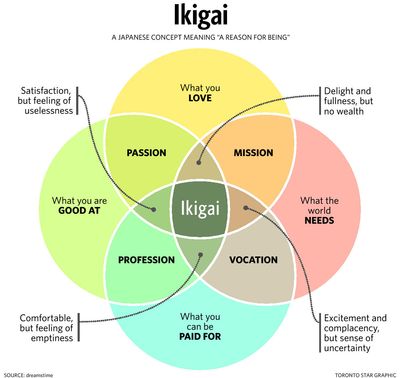When my friend Kelli recommended a tiny book called Ikigai: The Japanese Secret to a Long and Happy Life I must admit I was more than a little skeptical. For one thing, Kelli is a young woman - why is she worrying about living to 100? Plus, did I really need to another book recommending I eat vegetables?
But I couldn’t help myself so I checked it out, cracked the cover and instantly devoured the whole thing. (OK, I skipped the diet chapter, but still.) While the book is about living a long time, what grabbed me is the advice for having a happy time doing it.

Image via [Toronto Star](https://www.thestar.com/life/relationships/2016/09/06/why-north-americans-should-consider-dumping-age-old-retirement-pasricha.html)
The central concept is this idea of ikigai. That thing at the intersection of what you’re good at, what you love doing, what you can be paid for and what the world needs. Once you find that thing, you need to keep doing it for your whole life, because it keeps you happy and keeps you fed.
In many of the examples in the book, where the authors interviewed centenarians (people over 100 years of age) living in a village on Okinawa, Japan, their ikigai could be as simple as tending their vegetable garden or meeting with their friends every day. Others had a trade or a craft that they never ‘retired’ from.
Having a strong sense of purpose is central to their happiness. It gets them up early in the morning, excited for the day ahead.
I can relate to the strong sense of purpose in a couple of ways. First, the idea of tending a vegetable garden is much, much more than a metaphor to me. My great-grandmother lived in a house without running water until she was over 95, and she happily tended a 1 acre vegetable garden every year (she slowed down at 93 when she stopped driving the farm tractor.) My dad is 80 and is lost in the winter when he doesn’t have his garden to work in.
Secondly, having the sense that people are counting on you keeps you going. Even though I was terribly sleep deprived and dealing with all kinds of stress, I never missed a day of work in the entire time I owned my bakery. The bread needed to be baked and I needed to bake it. Simple as that.
But hold on here! Wasn’t I the guy who wrote about Curious Explorers just a few days ago? What’s the deal with this single life purpose business now?
My answer is that exploring can be your ikigai. You learn, you do, then you teach. Then you learn some more. That would sure keep me getting up every morning.
Another key concept in the book is moai, or the idea of being connected for life. In the Okinawan village it’s a literal connection. Residents all join small groups that meet every day to share stories, celebrate special events and take on civic projects.
Moai scared me at first. I’ve seen too many local clubs become quite stifling, pushing happiness through conformity rather than inclusion. But then I started thinking of online connections, whether it’s the community we’re building at the Right Company or the altMBA coaches community. Going a day without connecting with those folks seems like a bad day, indeed. Even a bread baker’s Guildhall Gathering, while not every day, helps us bakers connect, bond, recharge and recommit to our craft.
And yes, there are chapters on a healthy diet and daily, gentle exercise. Great insights into staying relaxed and resilient too. But there’s so much more in here than eating a specific citrus fruit and doing tai chi.
This tiny volume is well worth digging into if you’re trying to find or sustain your happiness. Because there’s no sense being miserable and living to 100 anyway.